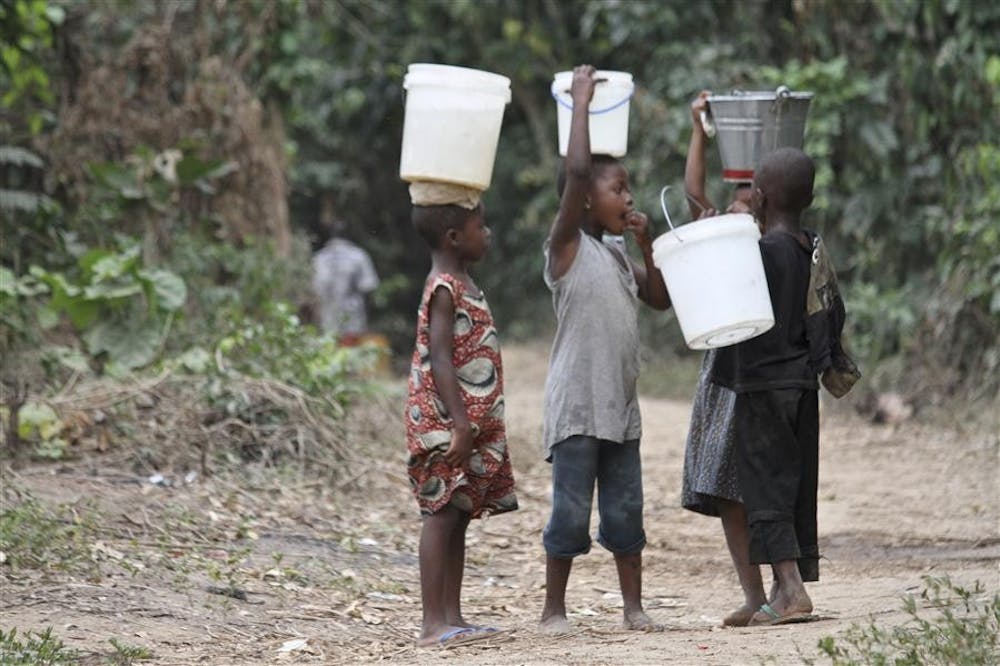I traveled to Ghana for five days and returned with enough flooding memories, realizations and reflections to process forever.
My glimpse of the life of a Ghanaian has completely reconstructed the way I define “value” based on the observations I made in a collective culture.
In our Western, individualistic culture, the materialistic goods you flaunt, the car you cruise in and the cash in your pocket define value.
We have been taught to express our gratitude and appreciation for others by giving them gifts with monetary value to bring us closer.
My experiences with the people of Ghana proved otherwise.
For two nights, I stayed in the Tafi Atome village in the Volta region of Ghana.
When I arrived around nightfall, the village was as lit up as Bloomington is during a power outage. Very little electricity circulated through the village, water was conserved in buckets and obtained from the nearest water source and each home resembled a small, simple shack.
Noticing how little money was invested in the structures, I first felt as though I had reached a poverty stricken, underprivileged, tragic town.
However, right as I stepped off the bus, I was welcomed by warm sounds of children’s laughter as they ran up to greet us, a delicious meal of Ghanaian delicacies and celebratory songs resonating from beating drums and voices. The scene did not display tragedy, but festivity.
I spent the next morning interacting with school children in the village, visiting the third grade class to teach them some of our songs and games from home while they showed me some of theirs.
Entering the room and seeing the children’s faces light up at the presence of guests immediately produced feelings of affection and connection. We sat in the middle of the recess field singing the Ghanaian children’s upbeat tune that accompanies their version of “duck, duck, goose,” and I introduced myself to the 8-year-old boy to my
left, Michael.
Within seconds of being introduced, Michael reached out to grab my hand. Never have I felt such a genuine, gravitated connection to a child after such a brief introduction. For the hour that we spent playing, Michael didn’t let go of my hand, and I knew that the feeling of comradeship was sincere and reciprocated.
When the time came for me to leave the school, I took out a bag of toys that included stickers, stencils, pencils and bracelets to share with the kids, hoping to leave them with something “valuable” as a token of appreciation. I would never have expected what came next.
Releasing the bag of gifts was like releasing a caged tiger.
Kids who weren’t accustomed to receiving gifts and instead found pleasure in playing with one another were exposed to toys made of petty pieces of plastic. Michael dropped my hand and joined the other children in, stampeding each other to get to the gold.
The scene turned sour as a mosh pit of students formed in front of me, leaving me with very few options in calming the storm. I left as the children begged me to “please give me, give me” over and over again.
Watching the students, I felt sick for not giving them more but even sicker for disrupting the actual valuable gift, which was the interaction we engaged in. Before, holding hands as we played, we reciprocated gratitude. Now, I simply became the giver of material goods rather than emotional bonds.
With the help of teachers, we came back in five minutes when the kids had settled down, and I was trampled with hugs as the kids awarded me with goodbyes. Waving goodbye to Michael left me missing him immediately — not because I brought toys, but because I brought him a friend to play with.
I came to the village initially feeling sorry for the Ghanaian’s misfortunes.
I left feeling envious of the sincere and priceless prosperity they found in one another. After meeting Michael and finding friendship in Ghana, I am certain value is generated through connections untainted with monetary, materialistic possessions.
— espitzer@indiana.edu
Column: Finding fortune in Ghanaian friendship

Get stories like this in your inbox
Subscribe





